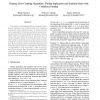164 search results - page 2 / 33 » Clustering Rules Using Empirical Similarity of Support Sets |
ICTAI
2007
IEEE
14 years 8 days ago
2007
IEEE
We review a method of generating logical rules, or axioms, from empirical data. This method, using closed set properties of formal concept analysis, has been previously described ...
SISAP
2008
IEEE
14 years 10 days ago
2008
IEEE
Similarity search has been proved suitable for searching in very large collections of unstructured data objects. We are interested in efficient parallel query processing under si...
ICDE
2000
IEEE
14 years 7 months ago
2000
IEEE
Dynamic Miss-Countingalgorithms are proposed, which find all implication and similarity rules with confidence pruning but without support pruning. To handle data sets with a large...
PAKDD
2004
ACM
13 years 11 months ago
2004
ACM
Although the task of mining association rules has received considerable attention in the literature, algorithms to find time association rules are often inadequate, by either miss...
ITSL
2008
13 years 7 months ago
2008
Clustering can be defined as a data assignment problem where the goal is to partition the data into nonhierarchical groups of items. In our previous work, we suggested an informati...

